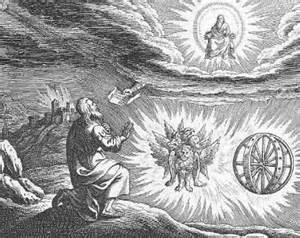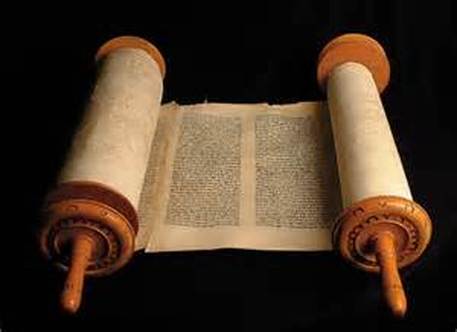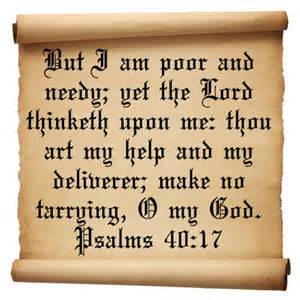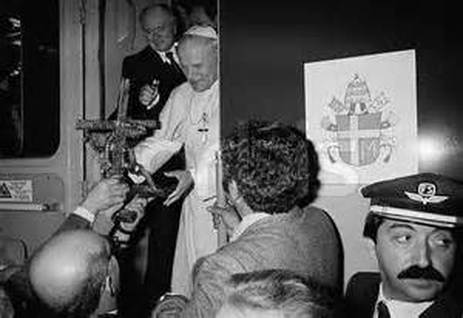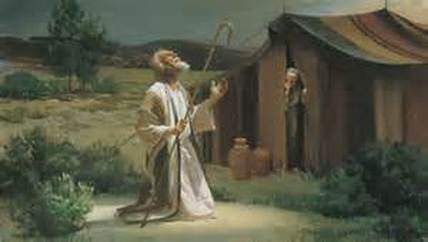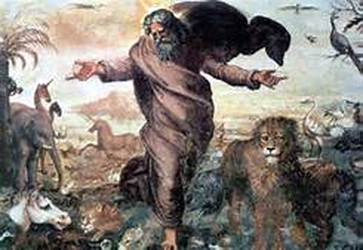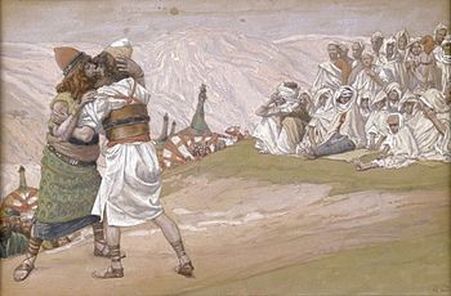Social Justice in the
Hebrew Scriptures
The foundations of Catholic social teaching can be found in the Old Testament. While the Gospel affirms and deepens the values found in the Law and the Prophets, the basics are there in full. Many attempts have been made to summarize the basic principles of our social teaching, but the US Bishops have distilled them to seven:
- Dignity of the Human Person and the Right to Life
- Human Rights and Responsibilities
- The Call to Family, Community, and Participation
- The Option for the Poor and Vulnerable
- The Dignity of Work and the Rights of Workers
- Solidarity
- Care and Stewardship of God's Creation
|
dignity of the Human
person
and the right to Life Then God said, “Let Us make man in Our image, according to Our likeness. . . So God created man in His own image; in the image of God He created him; male and female He created them. (Genesis 1:26-27) …from man in regard to his fellow man I will demand an accounting for human life.” (Genesis 9: 5b) Jeffery Rosario notes that “On every other day during creation week, God simply spoke things into existence. But when creating humanity, mere words would not suffice. God sends a message by stooping down and forming man with His own hands. The result is a new race bearing the “image” and “likeness” of God. There’s a solemnity there that is not displayed in any other part of creation…. This privilege and role conferred only to kings in other creation accounts is actually there in the Genesis record. But in Genesis it extends to all human beings: all humans are made in the image and likeness of God and are given dominion over the earth.”[1] Genesis 9:5-6 sees this fact of human beings being created in the image and likeness of God as the foundation for the prohibition against murder. Our lives are not our own, but a supremely valuable gift of God. A purely naturalistic view of the world has great difficulty establishing that human beings have equal value and equal rights. Given the clear inequality of human merit (talents, skills, character, personality, etc.) how can each of us be “naturally” equal in value and possess equal rights? As Rosario puts it, “from a Darwinian perspective. It’s survival of the fittest, and only the strong survive. And in that case, there is no basis for social justice and equal rights.” But belief in a Creator God enables us to see that we are all sons and daughters of God (and therefore brothers and sisters to each other, but more on that under the principle of solidarity), equally dependent on God for our existence and individual essence, and therefore all equally valuable in God’s eyes just as all a mother’s children are equally valuable in hers. Further, as shown by Gn 1:1-31, creation in all its forms, including humans, is fundamentally good, implying that all life from womb to tomb is worthy of respect. The US bishops stressed the centrality of this fact in Economic Justice for All: At the summit of creation stands the creation of man and woman, made in God’s image. As such every human being possesses an inalienable dignity that stamps human existence prior to any division into races or nations and prior to human labor and human achievement (Gn 4:11). Human Rights and responsibilities Moses summoned all Israel and said to them, “Hear, O Israel, the statutes and decrees which I proclaim in our hearing this day, that you may learn them and take care to observe them. (Deuteronomy 5:1) Seek the welfare of the city to which I have exiled you; pray for it to the LORD, for upon its welfare your own depends. (Jeremiah 29:7) Our rights as human beings flow from our being created “in the image and likeness of God,” but these rights can only be enjoyed if they are respected by others. Our responsibilities therefore are inextricably connected to our rights. They flow naturally from our duties toward our Creator/Parent and our connectedness to all God’s children, our own brothers and sisters. Economic Justice for All notes that the covenant at Sinai, “far from being an arbitrary restriction of the life of the people… made life in community possible. The specific laws of the covenant protect human life and property, demand respect for parents and the spouses and children of one’s neighbor, and manifest a special concern for the vulnerable members of the community: widows, orphans, the poor, and strangers in the land.” However, the bishops also write that “Biblical justice… is not concerned with a strict definition of rights and duties, but with the rightness of the human condition before God and within society.” That enumeration of specific rights and responsibilities will come later in our study of the encyclicals. The prophet Jeremiah, speaking to the Jewish exiles in Babylon, exhorts them to seek the good of even that pagan city, for their own welfare depends on that of the surrounding society. How much more, then, should we work for the good of our own community, nation, and, given our global interconnectedness, our world? By fulfilling our responsibility to the common good, we ensure our own security and happiness. Call to family, Community and participation The LORD God said: It is not good for the man to be alone…. That is why a man leaves his father and mother and clings to his wife, and the two of them become one body. (Genesis 2:18; 24) Then the LORD asked Cain, Where is your brother Abel? He answered, “I do not know. Am I my brother’s keeper?” (Genesis 4:8-15) …If each of you deals justly with your neighbor; if you no longer oppress the alien, the orphan, and the widow; if you no longer shed innocent blood in this place or follow after other gods to your own harm only then will I let you continue to dwell in this place, in the land I gave your ancestors long ago and forever. Jeremiah 7:5b-7 According to Gaudium et Spes (#12): “By his innermost nature man is a social being, and unless he relates himself to others he can neither live nor develop his potential.” Human beings are not created to be solitary. For this reason men and women leave their parents, “become one body,” and start families of their own, the building blocks of society. Cain failed to recognize that he was in fact “his brother’s keeper.” His sin was not only against his brother, but humanity in general. Sin has a social dimension. Refusal to respect our brothers’ and sisters’ rights ruptures the entire community. In Economic Justice for All, “The sin of our first parents had other consequences as well. Alienation from God pits brother against brother (Gn 4:8-16) in a cycle of war and vengeance (Gn 4:22-23). Sin and evil abound, and the primeval history culminates with another assault on the heavens, this time ending in a babble of tongues scattered over the face of the earth (Gn 11:1-9). Sin simultaneously alienates human beings from God and shatters the solidarity of the human community. And as Jesus was to emphasize in the story of the Good Samaritan, our neighbor is our brother or sister as well. Our ability to “dwell” in a peaceful, harmonious society is determined by our willingness to “deal justly” with our neighbors, who include not only the poor and marginalized (orphans and widows) but the stranger or alien in our midst as well. That means, among other things, that each member of the community has both the right and the duty to join with his or her fellows in “seeking together the common good and well-being of all,” as the USCCB’s “Seven Themes of Catholic Social Teaching” puts it. Option for the Poor and Vulnerable You shall not oppress or afflict a resident alien, for you were once aliens residing in the land of Egypt. You shall not wrong any widow or orphan. If ever you wrong them and they cry out to me, I will surely listen to their cry. (Exodus 22:20-22) Open your mouth in behalf of the mute, and for the rights of the destitute; Open your mouth, judge justly, defend the needy and the poor! (Proverbs 31:8-9) Is this the manner of fasting I would choose, a day to afflict oneself? To bow one’s head like a reed, and lie upon sackcloth and ashes? Is this what you call a fast, a day acceptable to the LORD? Is this not, rather, the fast that I choose: releasing those bound unjustly, untying the thongs of the yoke; Setting free the oppressed, breaking off every yoke? Is it not sharing your bread with the hungry, bringing the afflicted and the homeless into your house; Clothing the naked when you see them, and not turning your back on your own flesh? (Isaiah 58:5-7) From the story of Exodus to the establishment of the Monarchy and throughout the Prophetic tradition, we see that Yahweh is particularly concerned for the poor, vulnerable and oppressed, often referred to as “the widow, the orphan and the stranger. The US bishops in Economic Justice for All write that “what these groups of people have in common is their vulnerability and lack of power. They are often alone and have no protector or advocate. Therefore, it is God who hears their cries (Pss 109:21; 113:7), and the king who is God's anointed is commanded to have special concern for them.” Egypt learns the hard way that the God of Israel wants justice for his people, and that it is not forthcoming their oppressors will suffer. Ignoring or taking advantage of the poor brought God’s wrath (Exodus 22:22-24; Job 31:21-23), and when Israel failed to do so the nation too suffered God’s judgment (Isaiah 1:15-17; Jeremiah 5:28-29). Care for the poor was such a serious matter that giving to the poor is seen as the indispensable sign of obedience to his law (Deuteronomy 16:12-13), and Yahweh makes justice for the poor a primary criterion for judging the King (Ezekiel 34:4). A hallmark of the Messiah would be fairness to the weak (Ps 72; Isaiah 11). Amos (5:7f) and Isaiah (10:1f) castigate rulers who passed laws that favored the powerful and judges who withheld legal justice for bribes. In Proverbs 31 we hear the call not just to charity, but to advocacy on behalf of the needy. Finally, we learn that without justice, our worship itself is of no value. The first chapter of Isaiah opens with a scathing denunciation of those who go to services on the Sabbath but can’t get wait to get back to making a profit by cheating their customers, and in near the end we read that the fasting that is most pleasing to Yahweh is that which cares for the afflicted and sets free the oppressed. dignity of work and rights of workers The LORD God then took the man and settled him in the garden of Eden, to cultivate and care for it. (Genesis 2:15) Six days you may labor and do all your work, but the seventh day is a sabbath of the LORD your God. You shall not do any work, either you, your son or your daughter, your male or female slave, your ox or donkey or any work animal, or the resident alien within your gates, so that your male and female slave may rest as you do. (Deuteronomy 5:13f) You shall not exploit a poor and needy hired servant, whether one of your own kindred or one of the resident aliens who live in your land, within your gates. On each day you shall pay the servant’s wages before the sun goes down, since the servant is poor and is counting on them. Otherwise the servant will cry to the LORD against you, and you will be held guilty. (Deuteronomy 24:14f) Humans must work, not merely as a punishment for sin, but as a way of exerting “dominion” over the earth. Work is sometimes seen as a “curse,” but in the Old Testament it is not work that is cursed due to the sin of Adam, but the ground that is to be worked (Genesis 3:17). (As Andrew Courtis Simon[1] notes, “If you drink curdled milk you don’t say that the act of drinking is curdled; there is a clear distinction between the action and the thing acted upon.) Work that contributes to society is blessed by God (Deuteronomy 14:28f). Work has an inherent dignity Yet work is hard, and each of us must “get your bread from the sweat of your brow until you return to the ground.” Therefore God made rest from work a commandment. Further, Yahweh forbids the exploitation of the worker. solidarity and the common good The LORD said to Abram: Go forth from your land, your relatives, and from your father’s house to a land that I will show you. I will make of you a great nation, and I will bless you; I will make your name great, so that you will be a blessing. I will bless those who bless you and curse those who curse you. All the families of the earth will find blessing in you. (Genesis 12:1-3) For the peace of Jerusalem pray: “May those who love you prosper! May peace be within your ramparts, prosperity within your towers.” For the sake of my brothers and friends I say, “Peace be with you.” For the sake of the house of the LORD, our God, I pray for your good. (Psalm 122:6-9) As noted earlier, human solidarity is rooted in the simple fact that as sons and daughters of God, we are all brothers and sisters to each other. In the story of Abraham, we see that the “Chosen People” were elect, not because they were more blessed or beloved by God compared to other peoples, but because they were called to become a blessing for all the nations. Our salvation is tied directly into the salvation of others; our fates are inextricably linked. Pastor Wayne Phillips[2] has remarked that “In the Creation story and the pattern of Scripture, there is a flow of receiving what is good from God and extending it to others.” He sees this our participation in this pattern as “the work of reversing the curse” of Genesis 3. Pope Benedict, in an address on Jan. 24, 2013, said “The blessing [of Abraham], in Holy Scripture, is linked primarily to the gift of life that comes from God, and manifests itself primarily in fertility, in a life that is multiplied, passing from generation to generation. And the blessing is linked also to the experience of owning a land, a stable place to live and grow in freedom and security, fearing God and building a society of men loyal to the Covenant, ‘a kingdom of priests and a holy nation’ (cf. Ex 19:6).” In the psalm, we see that true peace and prosperity come not from “taking care of #1,” or even merely of our own loved ones, but by ensuring the good of the entire community. In other words, we are all in this together! care for God’s creation The LORD said to Moses on Mount Sinai: “Speak to the Israelites and tell them: When you enter the land that I am giving you, let the land, too, keep a sabbath for the LORD. For six years you may sow your field, and for six years prune your vineyard, gathering in their produce. But during the seventh year the land shall have a sabbath of complete rest, a sabbath for the LORD when you may neither sow your field nor prune your vineyard. The aftergrowth of your harvest you shall not reap, nor shall you pick the grapes of your untrimmed vines. It shall be a year of rest for the land. While the land has its sabbath, all its produce will be food to eat for you yourself and for your male and female slave, for your laborer and the tenant who live with you, and likewise for your livestock and for the wild animals on your land. (Leviticus 25:1-7) In the first creation story in Genesis, we see that God made the heavens and the earth and it was good. According to the US Bishops’ 1991 statement Renewing the Earth: People share the earth with other creatures. But humans, made in the image and likeness of God, are called in a special way to "cultivate and care for it" (Genesis 2:15). Men and women, therefore, bear a unique responsibility under God: to safeguard the created world and by their creative labor even to enhance it. Safeguarding creation requires us to live responsibly within it, rather than manage creation as though we are outside it. The human family is charged with preserving the beauty, diversity, and integrity of nature, as well as with fostering its productivity. Yet, God alone is sovereign over the whole earth. "The LORD'S are the earth and its fullness; the world and those who dwell in it" (Ps 24:1). Like the patriarch Noah, humanity stands responsible for ensuring that all nature can continue to thrive as God intended. After the flood, God made a lasting covenant with Noah, his descendants, and "every living creature." We are not free, therefore, to use created things capriciously. Humanity's arrogance and acquisitiveness, however, led time and again to our growing alienation from nature (see Genesis 3–4, 6–9, 11ff). In the Bible's account of Noah, the world's new beginning was marked by the estrangement of humans from nature. The sins of humankind laid waste the land…. To curb the abuse of the land and of fellow humans, ancient Israel set out legal protections aimed at restoring the original balance between land and people (see Lev 25). Every seventh year, the land and people were to rest; nature would be restored by human restraint. And every seventh day, the Sabbath rest gave relief from unremitting toil to workers and beasts alike. It invited the whole community to taste the goodness of God in creation…. But people did not honor the law. A few went on accumulating land, many were dispossessed, and the land itself became exhausted. God then sent his prophets to call the people back to their responsibility. Again the people hardened their hearts; they had compassion for neither the land nor its people. The prophets promised judgment for the evil done the people of the land, but they also foresaw a day of restoration, when the harmony between humanity and the natural world would be renewed (see Isaiah 32:15b-20). Peace & Reconciliation in the Hebrew Scriptures In Genesis, God brings order and harmony out of chaos, which empowers humanity to share in God’s work as co-creators. Ted Grimsrud writes: “The creation story presents harmony between humanity and God and among human beings as our default human circumstance. We start as peaceable creatures in harmony with (even in the image of) a peaceable God.”[3] Yet most Christians see the Old Testament as problematic for peace theology, and many see the God of the Old Testament as anything but peaceable. However, one could argue that the basic message of the Old Testament is that God intends restore a broken creation and bring healing to fractured humanity through the establishment of a people who know and love God, live in right relationship according to his laws, and become a conduit of peace and blessing to all the nations. In their 1983 pastoral letter, The Challenge of Peace, the US Bishops acknowledge that “violence and war are very much present in the history of the people of God, particularly from the Exodus period to the monarchy. God is often seen as the one who leads the Hebrews in battle, protects them from their enemies, makes them victorious over other armies (see, for example, Dt. 1:30; 20:4; Jos. 2:24; Jgs. 3:28).” As a smaller, weaker nation on the regional scene, “warrior” was a metaphor that “enabled them to express their conviction about God's involvement in their lives and his desire for their growth and development… [and] provided the people with a sense of security; they had a God who would protect them even in the face of overwhelming obstacles.” They grant the powerful influence of this image on the Old Testament understanding of the involvement of God in their history, but insist that this was not the only image, and that, particularly after the experience of the exile, when God was no longer identified with military victory and might, it was gradually transformed into other images and understandings. Turning to the notion of peace in the Old Testament, the bishops note that “peace is always seen as a gift from God and as fruit of God's saving activity,” and that the individual's personal peace is not greatly stressed [but] viewed primarily as they pertain to the community and its unity and harmony. Furthermore, this unity and harmony extend to all of creation; true peace implied a restoration of the right order not just among peoples, but within all of creation. This “right order” was maintained through the people’s fidelity to the covenant, which bound them to obedience to God’s laws and committed Yahweh to be present to the community and to save them from their foes and lead them to freedom. As we’ve already seen, covenant fidelity included care for the needy and vulnerable. Furthermore, write the bishops, it “demanded that Israel put its trust in God alone and look only to him for its security.” Isaiah, Jeremiah and Ezekiel all condemn in no uncertain terms the false prophets who claimed there was peace in the land while idolatry and injustice continued. Jeremiah and Isaiah both warned seeking security through their own strength or alliances with other nations rather than trusting in God (Is. 7:1-9; 30:14; Jer. 37:10). Isaiah 48:18 laments: "O that you had hearkened to my commandments! Then your peace would have been like a river, and your righteousness like the waves of the sea." Isaiah (2:1-5) and Micah (4:1-7) extend this promise of peace to the final age, the Messianic time, when all peoples and all creation would be reconciled in an ultimate reign of peace. This eschatological vision became an integral part of the hope of the Old Testament. There will be no need for instruments of war (Is. 2:4; Mi. 4:3). A messiah will appear, God’s servant upon whom God spirit rests: "He will not cry or lift up his voice, or make it heard in the street; a bruised reed he will not break and a dimly burning wick he will not quench; he will faithfully bring forth justice" (Is. 42:2-3). Righteousness and peace will embrace (Ps. 85:11). [1] Hill Bible Chuch Blog, 10-18-12 [2] North Shore Baptist Church website, The Story of God [3] Old Testament Bases for Christian Peace Theology, http://peacetheology.net/2011/01/13/old-testament-bases-for-christian-peace-theology-2/ For further reading: http://www.usccb.org/bible/understanding-the-bible/study-materials/articles/roots-of-catholic-social-teaching-found-in-the-old-testament-prophets.cfm http://peacetheology.net/2012/06/04/the-prophet-amos-and-restorative-justice/ http://peacetheology.net/2011/01/13/old-testament-bases-for-christian-peace-theology-2/ http://www.biblicalresearchreports.com/peaceoldtestament.php McKinney, Hania and Hill, Individualism, Consumerism and Greed: A Response from the Old Testament Prophets and Catholic Social Teaching. The Pastoral Review, Jan/Feb 2013. McKinney, Hania and Hill, The Biblical Roots for Catholic Social Teaching on the Preferential Option for the Poor. The Pastoral Review, July/Aug 2013. |
The Importance of the Individual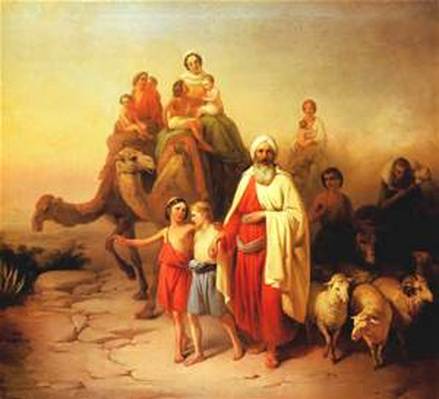
Historian Thomas
Cahill shows how ancient Mesopotamians viewed time as cyclical, history as the
Great Wheel, (representing e.g., the phases of the moon, changing seasons, female
fertility cycles), and humans as caught in a bleak, endless, predetermined
cycle.
Abraham, our “father in faith” and one of the central figures in the Bible, is called by Yahweh out of his familiar world and into a mysterious journey of discovery. He steps out of the cycle and makes free decisions that will impact future generations. Time is linear, not cyclical; the future is real. And that means the individual matters in a new way. So what was Abraham “called out” to do? “For I have chosen him, that he may command his children and his household after him to keep the way of the Lord by doing righteousness and justice, so that the Lord may bring to Abraham what he has promised him. “(Genesis 18:19, ESV) There is a clear connection between the call of Abraham and God’s passion for justice. He was called to spearhead a justice movement in the world! And from Abraham’s seed comes the people of Israel. God called Israel into existence to have a strategic way to model “righteousness and justice” on earth, finding ultimate embodiment and expression in Jesus Christ. Israel was to be a prototype, not only of how humans should relate to God, but also how humans should relate to one another. That’s what “righteousness and justice” is all about. They were to protect and uphold the rights of all human beings because they were created in God’s own image, and hence possess inherent value. They were to be the original human rights activists; people on a passionate campaign against human oppression and exploitation. And the implications for social justice are real. We’re not left with a few isolated passages that encourage us to promote social justice and uphold human rights. Justice and righteousness form the very framework of the biblical worldview. Jeff Rosario, www.lightbearers.org/abraham-father-of-justice/ Ezekiel: Personal ResponsibilityThe word of the LORD came to me: Son of man, what is the meaning of this proverb you recite in the land of Israel: “Parents eat sour grapes, but the children’s teeth are set on edge”?
As I live—oracle of the Lord GOD: I swear that none of you will ever repeat this proverb in Israel. For all life is mine: the life of the parent is like the life of the child, both are mine. Only the one who sins shall die! If a man is just—if he does what is right… if he oppresses no one, gives back the pledge received for a debt, commits no robbery; gives food to the hungry and clothes the naked; if he does not lend at interest or exact usury; if he refrains from evildoing and makes a fair judgment between two opponents; if he walks by my statutes and is careful to observe my ordinances, that man is just—he shall surely live—oracle of the Lord GOD. But if he begets a son who is violent and commits murder, or does any of these things, even though the father does none of them…this son certainly shall not live. Because he practiced all these abominations, he shall surely be put to death; his own blood shall be on him. But, in turn, if he begets a son who sees all the sins his father commits, yet fears and does not imitate him… this one shall not die for the sins of his father. He shall surely live! Only the father, since he committed extortion and robbed his brother, and did what was not good among his people—he will die because of his sin! You ask: “Why is not the son charged with the guilt of his father?” Because the son has done what is just and right and has been careful to observe all my statutes—he shall surely live! Only the one who sins shall die. The son shall not be charged with the guilt of his father, nor shall the father be charged with the guilt of his son. Justice belongs to the just, and wickedness to the wicked. But if the wicked man turns away from all the sins he has committed, if he keeps all my statutes and does what is just and right, he shall surely live. He shall not die! None of the crimes he has committed shall be remembered against him; he shall live because of the justice he has shown. Family in the Mosaic LawThe Bible has a more communal sense of people and family than is generally held in Western cultures today, where citizens are more individualized than people in the Middle East and definitely more so than the people of the ancient near East. When God saved Noah from the flood, it wasn't an individual case salvation, but a salvation for him, his wife, his sons and his sons’ wives. In other words, his family was saved (Genesis 6:18). When God called Abraham out of Haran, He called him and his family (Genesis 12:4-5). The sign of the Abrahamic covenant (circumcision) was to be applied to all males within one's household, whether they were born into the family or are part of the household servant staff (Genesis 17:12-13). In other words, God's covenant with Abraham was familial, not individual.
The importance of family can be seen in the provisions of the Mosaic covenant. For example, two of the Ten Commandments deal with maintaining the cohesiveness of the family. The fifth commandment regarding honoring parents is meant to preserve the authority of parents in family matters, and the seventh commandment prohibiting adultery protects the sanctity of marriage. From these two commandments flow all of the various other stipulations in the Mosaic Law which seek to protect marriage and the family. The health of the family was so important to God that it was codified in the national covenant of Israel. (www.gotquestions.org) The Poor in Mosaic LawThe plight of the poor is one of the issues that matters most to God, and his Law made truly astounding provisions to help them, not the least of which were economic protections:
Gleanings and Harvests: The corners of fields and the grapes dropped by the workers were reserved for the poor (Deuteronomy 24:17; Leviticus 19:9-10). The poor were also allowed to eat from land that lay fallow or idle in the Sabbath years (Leviticus 25:1-7; Deuteronomy 15:1-11). Protection from Creditors: Creditors could not charge interest or keep garments (which provided warmth and doubled as one’s blanket at night), nor could they take the tools of a man’s trade as security for a loan. These provisions ensured people’s ability to earn a living and also prevented extreme hardships (Exodus 22:25-27; Deuteronomy 24:12-13). Right to Timely Wages: The poor worker, whether a stranger or brother, was to receive his wages on the day of his labor, all the more so if he had need of it immediately (Leviticus 19:13; Deuteronomy 24:14-15). Year of Jubilee: Once every 50 years, Jubilee provided a comprehensive program of debt cancellation, liberation from indentured servitude, and the complete restoration of each family’s ancestral property, granting the poor a fresh start (Leviticus 25:8-22). Kinsman Redeemer: Family members were to help each other repurchase their land if they fell into debt and lost it (Leviticus 25:23-34). Family members could also purchase freedom for one another if they were forced into slavery to meet financial needs (Leviticus 25:47-55). Widows could also be saved from their plight by kinsman redeemers, as in the case of Boaz’s aid to Ruth and her mother-in-law Naomi (Ruth 4:1-10). God’s law also gave the poor unprecedented social protections: Justice: Old Testament law prohibited judges to show partiality to the rich at the expense of the economically disadvantaged and oppressed (Exodus 23:1-9; Leviticus 19:15; Deuteronomy 24:17; Proverbs 31:4-9). The Lord declared that defending the cause of the needy and treating the poor with justice is the essence of what it means to know him (Jeremiah 22:16). Accordingly, the prophet Amos condemned the Israelites’ social injustice toward the poor as a violation of God’s law and priorities. Levirate Marriage: Women who became widows with no male heirs had the right to gain an heir by their husbands’ brothers, thereby securing a son to care for them in their old age (Deuteronomy 25:5-10). Finally, God’s law made special provision for the poor’s inclusion in community worship: The Right to Rest: Servants, slaves, strangers and even animals were to participate in the Sabbath (Deuteronomy 5:1-15). Scaled Prices for Sacrifices and Offerings: Poor people who could not afford to present costly sacrifices and offerings were allowed to sacrifice less costly sacrifices that they could afford (Leviticus 5:7, 11; 14:21). The Tithe: One of the tithes was collected with a particular command to include aliens, the fatherless, widows and other poor people in a yearly community feast and celebration (Deuteronomy 14:22-29). Generous Giving Research Library, http://library.generousgiving.org/articles/display.asp?id=301 Pope John Paul the Great on WorkPope John Paul II, in Laborem Exercens, reflecting on Genesis 2:15, wrote:
Work is, as has been said, an obligation, that is to say, a duty, on the part of man. . . Man must work, both because the Creator has commanded it and because of his own humanity, which requires work in order to be maintained and developed. Man must work out of regard for others, especially his own family, but also for the society he belongs to, the country of which he is a child, and the whole human family of which he is a member, since he is the heir to the work of generations and at the same time a sharer in building the future of those who will come after him in the succession of history. A Blessing for All the NationsGod promises to Abraham that he will be a blessing for all the nations. A new era for the history of humanity is thus inaugurated, a history of blessing with reference to Abraham. This passage which comes from the Yahwist source of Genesis is located within the history of the people, in the context of a highly successful reign of Jewish kings -- a kingdom which showed that this people had truly become a powerful nation, and that its royal rule could become a blessing and a promise of prosperity for the peoples who lived within its domain or within the remote reaches of its territory.
Adel Theodore Khoury, VI Plenary Assembly of the Catholic Biblical Federation, Lebanon, 4 September 2002 Pope Paul VI on the Universal Destination of GoodsIn the very first pages of Scripture we read these words: "Fill the earth and subdue it." This teaches us that the whole of creation is for man, that he has been charged to give it meaning by his intelligent activity, to complete and perfect it by his own efforts and to his own advantage. Now if the earth truly was created to provide man with the necessities of life and the tools for his own progress, it follows that every man has the right to glean what he needs from the earth. The recent Council reiterated this truth: "God intended the earth and everything in it for the use of all human beings and peoples. Thus, under the leadership of justice and in the company of charity, created goods should flow fairly to all." Populorum Progressio, no. 22.
The Goal of JusticeA key point to me is the belief that the Bible ultimately identifies love and justice with each other. This seems crucial because it protects us from a situation where in the name of justice we justify treating some people as objects instead of as human beings. Then “justice” becomes a dehumanizing power-struggle with winners and losers. One practical problem with this is that the losers are never content with being losers and so the battle never ends.
Also, holding love and justice together protects us from making justice an abstraction, separate from its real meaning as a relationship-building, life-sustaining force. The concern for justice is people much more than “fairness”, “liberty”, or “entitlements”. In this way of thinking, justice is primarily “corrective justice”. Thus, justice’s goal is reconciliation. Injustice must be opposed and resisted—but only in ways which hold open the possibility of reconciliation. What happens to the oppressors matters, too, if justice is the goal. Ted Grimsrud, Peace Theology, http://peacetheology.net/2012/06/04/the-prophet-amos-and-restorative-justice/ |
